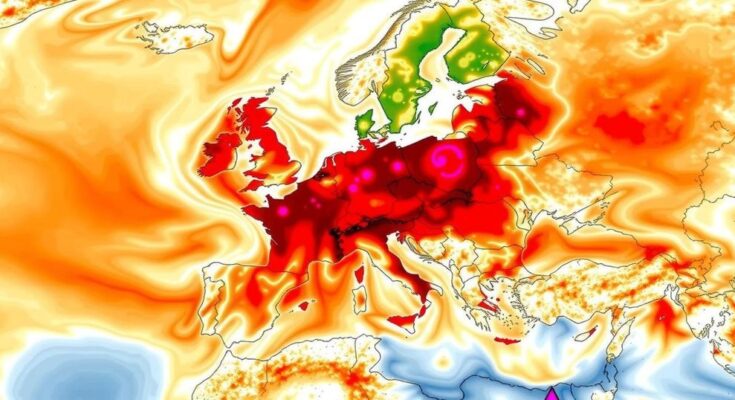The EU’s Copernicus Climate Change Service reports that 2024 is projected to be the hottest year on record, with average global temperatures surpassing 1.5 degrees Celsius since pre-industrial times. Extreme weather patterns, including severe droughts and tragic floods, have resulted from human-caused climate change. Despite international agreements to combat these changes, global emissions remain at record levels, demonstrating the need for more effective initiatives.
A recent report from the European Union’s Copernicus Climate Change Service has indicated that 2024 is on track to become the hottest year on record. This year has already surpassed previous averages, with temperatures exceeding 1.5 degrees Celsius above the pre-industrial levels of 1850-1900. The report highlights the severe weather events experienced globally in 2024, including extreme droughts in Italy and South America, fatal floods in Nepal, Sudan, and Europe, and heatwaves in countries such as Mexico and Saudi Arabia. Human-caused climate change is cited as a definitive factor in these climatic disruptions.
The Copernicus Climate Change Service has confirmed data from January to November, indicating continuity in record-high global temperatures, a trend projected to last well into early 2025. While unprecedented climate agreements have been made, with a recent $300-billion deal from UN climate talks, critics argue that such measures are inadequate to address the increasing costs of climate-related disasters. Carbon emissions from fossil fuel combustion remain the primary driver of climate change, and although many governments have pledged to reduce emissions to net zero, predictions suggest that emissions will reach a new peak this year.
Scientists are also closely observing the potential formation of the La Nina weather pattern in 2025, which could temporarily lower global temperatures. However, its development would not invalidate the broader trend of warming characterized by emissions. Experts caution that the mere potential for cooler conditions does not guarantee a reprieve from extreme weather phenomena, which are expected to persist.
The issue of climate change has garnered significant attention in recent years, particularly as scientific studies continuously link human activity to rising global temperatures and increased frequency of extreme weather events. With records maintained by entities such as the Copernicus Climate Change Service, researchers analyze global temperature trends, contextualizing the current state against historical data dating back to the mid-19th century. The implications of climate fluctuations are critical, affecting various regions through drought, flooding, and heightened temperatures. Amidst these challenges, international agreements seek to make strides toward mitigating climate change, though skepticism remains about their effectiveness in the face of escalating environmental crises.
In summary, the Copernicus Climate Change Service has conclusively determined that 2024 will become the hottest year recorded, marking a substantial deviation from historical norms. Even as global efforts and agreements aim to confront climate change, increasing carbon emissions betray these commitments. The anticipation of a La Nina weather pattern introduces a complex dynamic to future temperature forecasts, but experts assert that dangerous weather phenomena will continue to pose significant risks, underscoring the urgency for more robust climate action.
Original Source: www.bangkokpost.com




